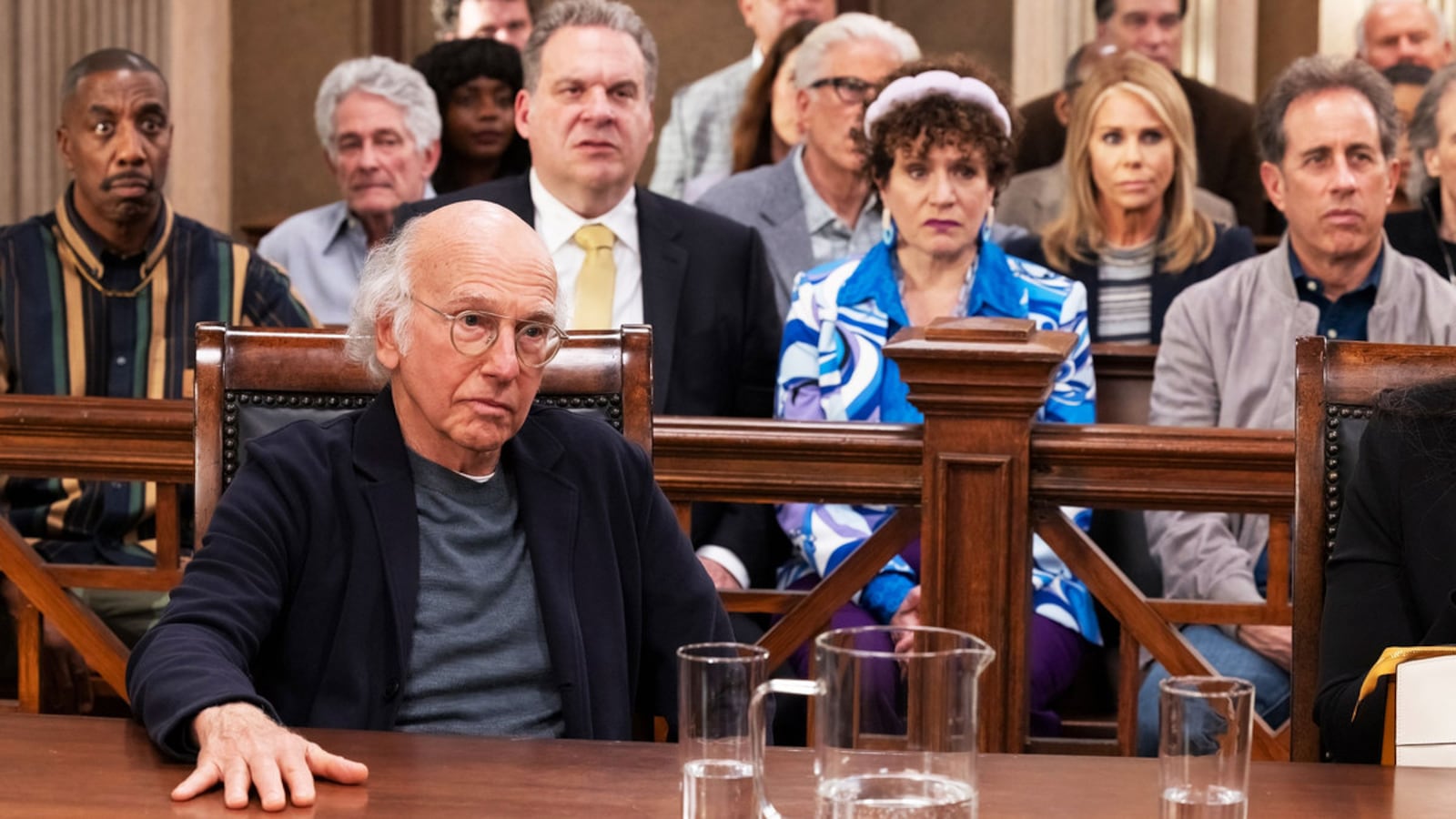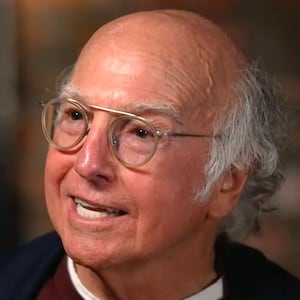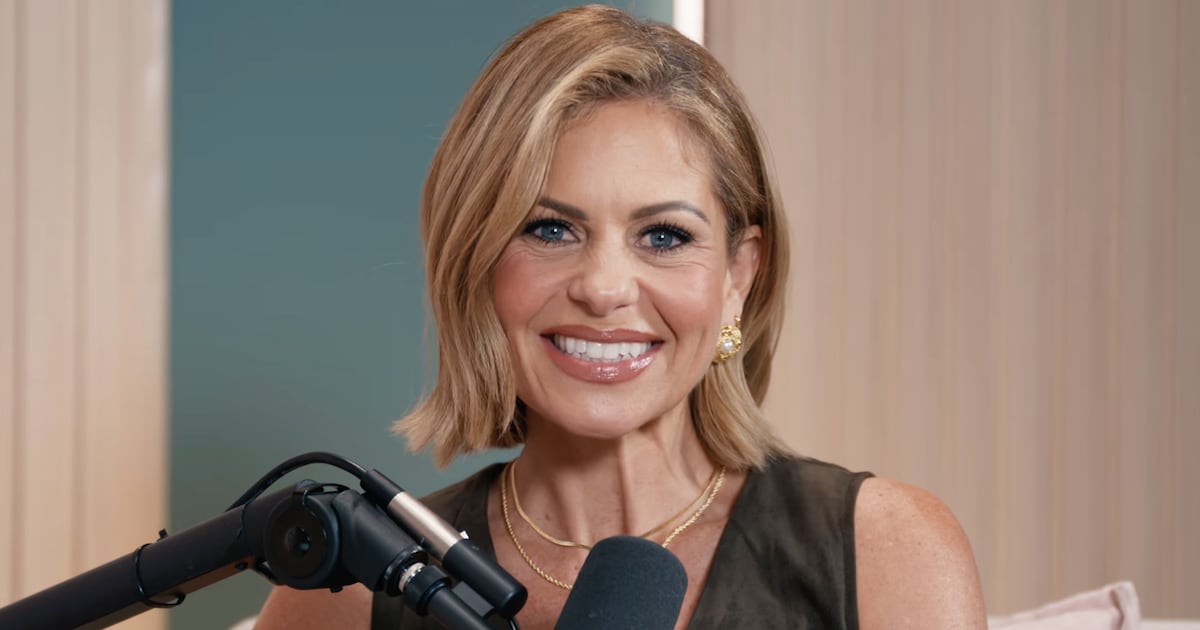Curb Your Enthusiasm ended its 12-season, 24-year run this past Sunday in perhaps the most fitting way possible: with a do-over of Seinfeld’s infamous series finale. In the final moments, Larry David was sent to jail for violating Georgia’s Election Integrity Act, after some of the series’ most memorably aggrieved guest stars testified to his extreme offensiveness. It was a direction that many fans saw coming from a mile away, thanks to carefully seeded references to Seinfeld’s much-maligned last episode—and David’s hand in it—throughout the season.
But Curb put a last-minute twist on this familiar ending, by having Jerry Seinfeld bail Larry out after a scant few moments in a jail cell. Turns out that one of Larry’s jurors broke his sequestration, and thus, the whole thing was declared a mistrial. Larry David was free to roam the Earth once more, pissing people off with his extreme impropriety.
While David and Curb executive producer/director Jeff Schaffer have contemplated ending the show before, Schaffer tells The Daily Beast’s Obsessed that as soon as the Seinfeld idea came to mind, they knew it was time to wrap. “That’s the funniest way to go out and the most Larry way to go out,” he said, in a conversation following the Sunday night finale. “‘Oh, you didn't like the other finale? Hey! Guess what? Here’s a big steaming pile of seconds. Choke on it!’”
Schaffer—along with Susie Essman, who played iconic Larry antagonizer Susie Green—talked to us about how that “steaming pile of seconds” came about, whether they were surprised that fans caught on quickly, and how they ended up whittling down that cavalcade of guest stars. Plus, they answer one of the show’s enduring questions: Were we supposed to like Larry this whole time?

Jerry Seinfeld and Larry David
John Johnson/HBOIn another interview about the finale, you talked about where the idea to remake the Seinfeld finale came from, and it sounded like the decision to end the series came as soon as you thought of that idea. Did you initially go into Season 12 not thinking it might be the last one?
Jeff Schaffer: I mean, honestly, every season is the last season. I go into every season thinking there’s never going to be another season. And I think that because Larry tells me that. At the end of a season, Larry puts all the jokes and stories he likes into the season, so his cupboard is a little bare—so how could he do another season? Because he’s the only human being on the planet who thinks he’s never going to come up with another idea.
Susie Essman: He’s like, “That’s it! I’m done!” But that’s Larry.
Schaffer: So this one, there was talk that it might be the final season, and he had maybe even mentioned it, but that’s normal chatter. That’s not something special. … Once we had this idea, this idea only works if it is the end, right? You want all the pomp and the hoopla of the final season. If you’re going to redo the final episode of Seinfeld, it needs to be the final episode of Curb, so that forces our hand.
Once you had the idea to redo the Seinfeld ending, you went back and threaded some references throughout the season, to the point where some viewers guessed that you were heading that way with the finale. Did you want it to be a surprise, or did you think people might figure it out ahead of time?
Schaffer: I think in our heads, when we were conceiving it, we wanted it to be more of a surprise. I think we underestimated just saying the word “trial” and how triggering that would be, and how much the audience was going to be on top of it. Also because it’s the final season—I guess we didn’t think that they would be parsing every word and everything to try and figure out where this was going to go.
But it very quickly dawned on us that it didn't matter, and it actually worked for us. That’s what the show is, right? In a scene with Larry, you’re like, “Oh my God, I can’t believe he’s going to go back and do that. I can’t believe he’s going to talk to that gay couple about whose semen was used for their baby.” But it’s still funny [when he does it]. … That’s really what this season was, was that kind of dynamic told over the course of a season as we worked toward the end.
Did you think it was going to end when we started to pull back in the jail? Did you think that was the end of the show?
I was hoping that there was going to be some subversion, but I did get scared for a second.
Schaffer: That’s exactly what we wanted. We wanted to take people right to the edge, to go, “Oh my God, they’re not really doing this, are they?” And then flip it.
Essman: Right. But if [the ending] had gotten out, if we hadn’t been all so good at keeping a secret, it still would have worked. It still would have been funny. I watched it last night and then I watched it again this morning, and it was still hilarious even though I knew the end.
It’s like when you rewatch old Curb [episodes] and you know exactly what's going to happen. You still laugh out loud.
That was part of what was fun with the trial, when all these former guest stars showed up. We see Jillian Bell and we instantly remember that she was in the episode with the “piss Jesus,” but it’s still hilarious to see her explain how Larry had wronged her. With the guest stars, was there anyone in particular you really wanted to see again, or hoped would come and wasn’t able to make it?
Schaffer: We actually ended up using everybody that got onto the witness stand. There was a lot of winnowing and figuring out before the shoot. And in fact, we added things when Greg Kinnear [who plays the prosecution lawyer] gives that long list, and you’re just seeing flashbacks. Those we played with in the edit, because we could just get voiceover from Greg and we could add and subtract there.
But we got everybody. Everybody we asked for was nice enough to come.
Essman: I’ve been thinking about it. If you go through all the episodes from Season 1, there are hundreds more people that you could have gotten that Larry’s offended and did wrong to. Hundreds.
Schaffer: As many as all the stars in the sky.
It must have been really hard to decide who the most furious people would be, because there’s just so, so many options.
Schaffer: There’s certain ones we banked too—like, Tracy Ullman [who plays Irma] wasn’t around then, so we banked her. Bruce [Springsteen], we banked, because we had shot with him months before.
In terms of other things happening in that courtroom—Susie, you were given one of the weirdest bits you had to do on the show. How did that scheme—with Susie agreeing to help Larry gain sympathy with the jury by pretending to be his sick partner in a wheelchair—come about? Why did Susie go along with it?
Essman: Susie has a history of going along with Larry. … It never works out, but I always like when we’re in cahoots. But what was the genesis of that, Jeff?
Schaffer: [Susie also thinks] this law is terrible. She was like, I’m willing to help you because I think this is bullshit. Susie is a liberal and just offended by this draconian law. We had the idea that Susie would help, but we were trying to figure it out. We were talking about, “Susie is going to be in the wheelchair. What’s Susie’s attitude gonna be?” And Larry and I were debating about this, and it was very clear that Susie should help, but unhappily.
It was just such a funny attitude to play. “Yeah, right, yeah, he’s great, he’s wonderful”—her heart not being in it at all, and him having to keep coaxing. Susie was so brilliant in that scene, and to talk about the improv of it, her lines about, “Oh, the kids, they jump up, when Larry’s here,” that’s all Susie. The rest of it is just Susie and Larry magic.
Essman: But that’s the whole show. You know, we have an outline. We don’t have lines. That is probably what I’ll miss the most, besides the laughter—we laugh all day—is the collaboration. Being able to write my own material, my own lines in, in my own Susie Green voice and having that freedom.
It’s the most freedom you could have as a performer, to be able to improvise like that. And when you get to improvise like that with a structure that is so brilliantly created and so funny—I just don’t see that ever happening again.
Schaffer: Every scene is a live rewrite. Watching the scene evolve, and these guys say something you didn’t expect, and they’re going off on these tangents—it’s just fun. Literally the only regret I have about the entire show is I wish people could see more of what we generated on set, because only a certain amount of it can fit in the show, and there’s so much great stuff that these guys come up with.

Jeff Garlin and Susie Essman
John Johnson/HBONow that the show’s over, is there any chance that you’ll release those outtakes?
Schaffer: Larry and I disagree on this. He’s like, "If it’s not in the show, people don’t want to see it.” I’m like, “No, Larry, people do want to see it.” And he’s just like, “No, no, it’s not going to happen. … This is the show we chose. This is what we’re doing. No bloopers.”
I feel like Larry just doesn’t want us to see him cracking up at literally everyone.
Schaffer: Nothing cracks him up more than Susie screaming at him. Susie screaming at him is honestly like someone is tickling him. He can’t stop. He’s like a giggling school girl.
Essman: I must remind him of his third grade teacher or something, because there’s such an adolescence to how he responds.
Speaking of Larry: Something he has said about the show is you’re not supposed to sympathize with anyone. That’s a big part of why it works—we all know Larry is an asshole, and everyone else is selfish in their own ways too.
But I really found myself wanting Larry to not be found guilty at the end. It wasn’t just because this law is reprehensible. It’s because after all this time, I do care about Larry. Is that against the nature of the show? Would Larry hate hearing that?
Essman: I don’t think he would hate hearing that at all. I think that he would like that. I think that we’re all lovable in our own heinous ways. … There’s something about the unlikeability of these characters that’s endearing.
Schaffer: They’re so true to themselves. There’s no malice. Larry’s a rule follower, and his rules might be different from yours, you might think that they’re arbitrary or insane, but he’s going to follow those rules. He’s going to respect wood. He’s going to put the coaster down, right? He’s a true believer. I always joke that he speaks for those who have no voice.
Essman: Also, morally and ethically, he’s frequently—I hate to say this, as Susie Green—but he’s almost always right.
Schaffer: Unless it’s funnier that he’s wrong.

Susie Essman
John Johnson/HBOI think that’s exactly it—that it’s all without malice. They rib each other so much, but it never goes to the level where anyone is being cruel.
Essman: We did this thing the other night [for Tribeca Film members]. Larry was saying how we’ll do a scene where we’re screaming and yelling and kicking each other out of the house, et cetera. And then, we’ll yell “cut.” And it’ll be like, “Okay, let’s go have dinner together.” It’s nothing personal.
Schaffer: Susie has said that Susie Green and Larry’s relationship is like a brother-sister relationship.
Essman: I really feel that way. And I really feel that way about him in real life too—but brother-sister when you’re little kids, where you scream, you fight, and you pull each other’s hair, but then the next day, you’re coloring together. It’s an acceptance of who each other is and that you’re a part of each other's lives. You don't question it.
Schaffer: Which answers one of the greatest questions in the universe: Why does Susie continually invite Larry to a dinner party?
He’s even at Susie and Jeff [Green, played by Jeff Garlin]’s anniversary dinner in the final episode.
Essman: He’s a part of the fabric of Susie's life, and she just accepts it.
This interview has been edited and condensed for clarity.







